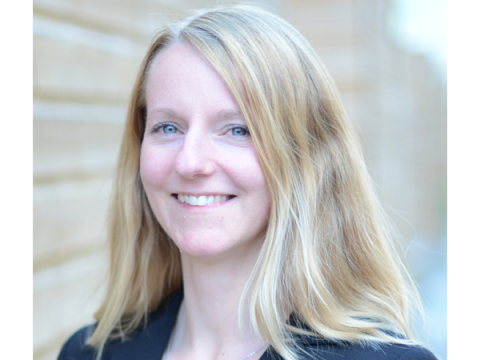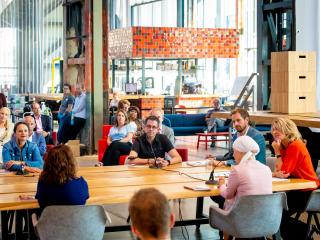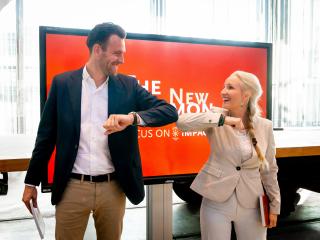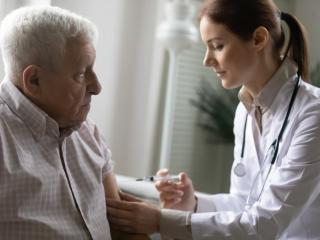Nynke van der Laan collaborates on developing and evaluating CoronaMelder app
In May 2020, Dr. Nynke van der Laan was asked by the Dutch Ministry of Health, Welfare and Sport to collaborate on developing and evaluating the CoronaMelder app. Since then the app has been introduced and evaluated for the first time. Van der Laan is Associate Professor of Digital Health Communication at the Communication and Cognition Department of the Tilburg School of Humanities & Digital Sciences. What makes her passionate about her work?
"I study how people make health-related decisions. In addition, I am interested in how new media and technologies, each with their unique features, can stimulate healthier choices. When making health choices, a balance needs to be struck between a very attractive option that offers a direct reward, such as a tasty but unhealthy snack, and an option that offers a future reward, such as snack tomatoes. This latter choice will only have an impact on a healthy and/or slim body in the longer term."

Developing this app has interesting behavioral science aspects
Given her expertise in the field of new technologies promoting health behavior, it was not surprising that Van der Laan was approached to become a member of the Minister’s taskforce Gedragswetenschappen (Behavioral Sciences Taskforce), that advises, among other things, on the development of the CoronaMelder app. The app, that has been available for downloading since October last year, registers whether you have been near anyone who has tested positive for Covid-19. The purpose of the CoronaMelder is that people know quicker if they are potentially infected and therefore quarantine and get tested sooner.
"There are a number of aspects to developing this app that are interesting from a behavioral science point of view. In order to be effective, the app must naturally be downloaded by many people. What affects the adoption of the app? In addition, it is important that people follow the advice given. Questions like the best way to communicate advice concerning health-stimulating behavior via the app is one of the topics."
How well has the CoronaMelder app been adopted?
Nynke van der Laan and her colleagues Jan de Wit and Nadine van der Waal have recently conducted a survey regarding the use of the CoronaMelder app. These are the most important results:
- 88,7% of the Dutch population are familiar with the CoronaMelder app and 27,2% reported that they are currently using it;
- young adults use the app least often;
- the intention to follow the advice given in the notification of the app is high;
- people think (wrongly) that the CoronaMelder keeps track of location and personal data;
- people believe that high general app use is required to contribute to coronavirus control.
Digital nudges
New technologies can intervene at various moments in these choice processes, something that until recently was impossible. Van der Laan has recently conducted research in collaboration with a supermarket, whereby health messages where incorporated in the hand-held scanner. If a customer scanned a product that is not healthy according to the existing guidelines of the Netherlands Nutrition Centre (e.g., white bread), the customer received a notification on the hand-held scanner suggesting a healthier product (e.g., whole-wheat bread). In this way, you can give direct feedback on people’s behavior, if they have agreed in advance, of course.
"In addition, a technology like virtual reality (VR) allows you to show the long-term effects of choices. Often these consequences will not materialize until far into the future so they are quite abstract. VR can visualize unhealthy behavior and allow people to experience them “themselves” and “now”, for instance, with an image of a fat or slim “you”. We increasingly make choices in digital environments and these environments are never neutral. They have been designed for effect and we know that small adaptations in the choice environment, what we call nudges, for example, the position or the visibility of options in shops or on screens, affect your choice. How can screens with options be designed in such a way that it becomes easier to make healthy choices? I study the effects of these digital nudges.”
Studying brain mechanisms
Van der Laan has also studied the effects of factors like lack of sleep, appetite, and personality traits on food choices, as well as underlying determinants. Another research line is aimed at fundamental attention and brain mechanisms, on how we make these choices. "What parts of the brain are involved, for instance, in balancing health benefit and tastiness? We have just completed a replication project on this subject with a functional MRI study, following NWO’s call with respect to Replication Studies." Given the new possibilities offered by technologies, her research has shifted from fundamental studies to practical ones on influencing actual behavior.
Combination of hobby and research
Nynke van der Laan has a Bachelor’s and Master’s degree in Nutrition & Health (Wageningen University) and a PhD in Psychology of Health and Neurosciences (UMC Utrecht, Utrecht University). She worked as an Assistant Professor at the University of Amsterdam (UvA). "In fact, my specialism is a combination of hobby and research. I used to be creative and design things, for example, programming games and creating VR environments. The virtual supermarket (the VirtuMart; in Dutch) started as a recreational project and, when I received a grant for it, I became increasingly proficient. It is used by researchers from various universities at home and abroad to study food choices. What really appealed to me at the Tilburg School of Humanities & Digital Sciences was that combination of Humanities and Digital Sciences. It is quite unique in our country. And furthermore, I am enthusiastic about the New Media Design track, which I coordinate."
The 'New Common'
The corona crisis has compounded major societal challenges. Tilburg University shares knowledge and insights to reshape our society. We are happy to discuss this New Common.
Date of publication: 22 October 2020



